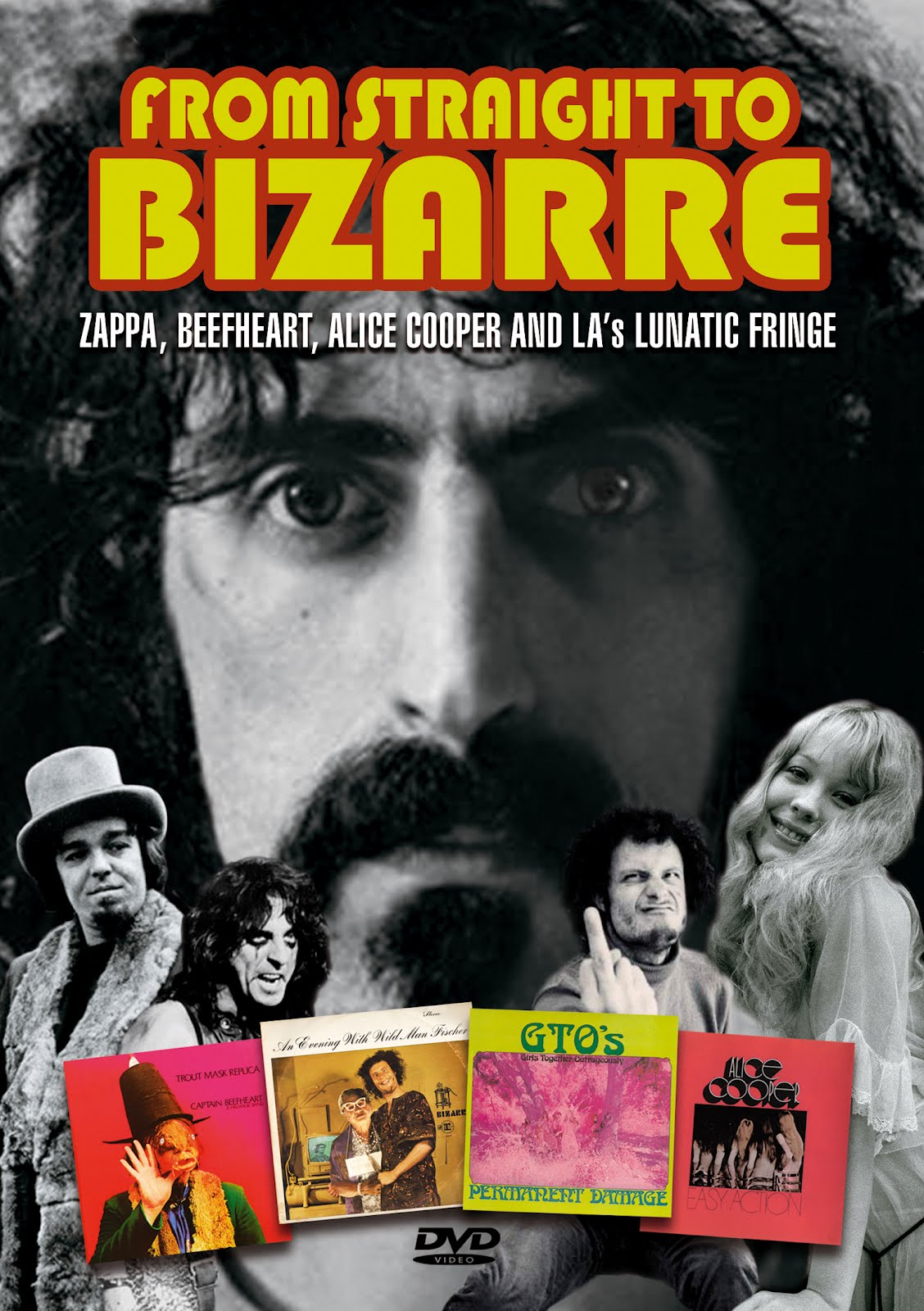
Sometimes with documentaries, length can be a hinderance. There’s such a thing as too much depth, and they can tip from fascinating to boring. Other documentaries, like From Straight To Bizarre about the other acts on Frank Zappa’s labels in the late 1960s and early 1970s, keep the interest up all the way through — in this case, through almost three hours. In fact, when I saw how long it was, I was a little worried — but I needn’t have. The release from Sexy Intellectual is very highly recommended to any Zappa fans, loaded with original music (and not weirdly lame knockoffs like the otherwise awesome David Bowie: Rare and Unseen) and interviews with the particulars.
From Straight to Bizarre talks to all sorts of people — Jeff Simmons, members of Alice Cooper, Drumbo and Zoot Horn Rollo from Captain Beefheart & His Magic Band, two of the GTOs and many Zappa biographers and journalists to provide the whole contextual picture. The doc focuses most on five albums: An Evening With Wild Man Fischer, Pretties For You by Alice Cooper, Permanent Damage by the GTOs, Trout Mask Replica and Jeff Simmons’ Lucille Has Messed My Mind Up. These aren’t the only albums talked about: Others, like the ill-fated debut of Essra Mohawk (under her real name, Sandy Horvitz) Sandy’s Album is Here at Last, the first from Bizarre, and the Lenny Bruce and Lord Buckley albums for Bizarre are also brought up — as are the acts shepherded by Zappa’s business partner, Herb Cohen, like Tim Buckley’s album Starsailor.
The film doesn’t whitewash either — Zappa’s failings as a producer and label head are brought up often. The documentary depicts a man who would get really into something, then have a falling out with the act, abandoning the production to be picked up by Ian Underwood, who despite his great talent as a musician, didn’t really have the interest or ability in production. It happened to Sandy Horvitz (who was even briefly a Mother of Invention), and it kept happening. Of course, to be fair to Zappa, he had an increasing amount on his plate from his own music career — and it’s pointed out several times that the man could be very encouraging for new artists, despite his public persona.
The albums on Straight and Bizarre generally ended up being more influential than they were commercially successful, though the same could be said for Zappa’s own output. The sociological aspects of the albums was another theme of the doc — Zappa was as much trying to make good records as he was trying to capture a scene not being documented by anyone else at the time. The GTO’s album in particular is pointed for being much more interesting as a document of the time rather than as a pop record — the non-musical segues are the most talked about pieces. The documentary also puts to bed the erroneous assumption that Zappa signed Wild Man Fischer as a freak show exploitation piece. Fischer’s given his due as a songwriter (particularly for the amazingly catchy “Merry-Go-Round”), but also his role in that scene and that idea of Zappa as audio documentarian.
The recording of An Evening With Wild Man Fischer is one of the most interesting segments; it’s the album that Zappa was most hands-on with. Despite promising backing from the Mothers to a few different artists, it was this that actually got the most Mothers time and energy; often when Zappa’d leave a project in a huff, he seemed to take the bulk of the Mothers with him. Tensions were raised with some of the other acts about this — they couldn’t figure why a record with absolutely no commercial potential would get so much time and money where more traditional bands were being ignored or shoved into rush recording jobs. Still, the results were worth it — even though An Evening With certainly cost Zappa more than it ever made. The album might be overstuffed and meandering — a common problem with Zappa, to be perfectly honest — but it’s still great to listen to and without it, we likely wouldn’t have the outstanding (not to mention slightly more traditional) albums produced by Barnes & Barnes, Pronounced Normal and Nothing Scary.
It’s amusing that the biggest commercial success from Zappa’s choices was Alice Cooper — who only had their first huge hit (“I’m Eighteen”) on their last album for Straight, and had their contract and albums picked up almost immediately by Warner Brothers, who’d been handling distribution for Straight. Still — every act on Straight/Bizarre had some high level of quality (even the GTOs, as a cultural document), and it’s a tragedy the saga only lasted as short as it did. I’d love for more artists to have this kind of control to get such odd records into stores nationwide. Of course, I wish that Zapple Records had released more than two things, so, I suppose my wishes might be a little suspect.
Still — if you’re a Zappa fan, you need to see From Straight To Bizarre. I’m certain you’ll find out stuff you didn’t know before… and at the very least, you’ll get to hear some of the music from some notoriously hard-to-find albums.










